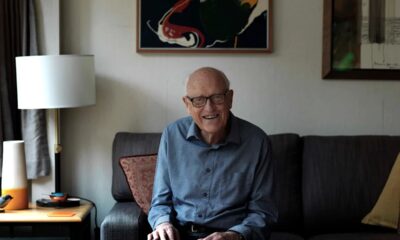Health
New Research Reveals Risks of Sleep Tracking Devices in New Zealand
The rise of sleep tracking devices in New Zealand has sparked concerns about a phenomenon known as “orthosomnia.” Recent statistics indicate that approximately 41% of New Zealanders are now using these devices, yet nearly 30% report not getting enough quality sleep. This paradox suggests that the pursuit of perfect sleep might be counterproductive, leading to increased anxiety around sleep quality.
A study conducted by the Sleep Health Foundation highlights that while many individuals are eager to monitor their sleep patterns, this obsession can create stress and lead to insomnia. The term “orthosomnia” describes this condition, where individuals become overly focused on achieving ideal sleep metrics, often resulting in the opposite effect.
Understanding Orthosomnia
Orthosomnia occurs when the data provided by sleep tracking devices causes users to fixate on their sleep scores, rather than enjoying restful sleep. This fixation can lead to sleepless nights filled with anxiety about how well one has slept, ultimately disrupting the very rest users hope to achieve. The Sleep Health Foundation warns that this phenomenon may contribute to a cycle of sleeplessness and stress.
The foundation’s research shows that while technology can provide insights into sleep patterns, it can also create unrealistic expectations. Users may become frustrated if they do not meet the sleep standards set by their devices. This can lead to a heightened state of alertness at bedtime, making sleep even more elusive.
The Impact of Sleep Tracking Technology
As sleep tracking technology becomes more prevalent, health professionals are urging caution. The data generated by these devices can be misleading. Many factors influence sleep quality, including lifestyle choices, stress levels, and overall health, which these devices may not adequately consider.
Experts recommend that individuals focus on developing healthy sleep habits rather than fixating on data. Simple practices like maintaining a consistent sleep schedule, creating a relaxing bedtime routine, and minimizing screen time before bed can significantly improve sleep quality without the need for constant monitoring.
The growing trend of using sleep devices raises important questions about the balance between beneficial technology and mental health. As New Zealanders increasingly rely on these tools, it is crucial to recognize the potential downsides they may bring. With sleep being essential for overall well-being, understanding the implications of sleep tracking is more important than ever.
In summary, while sleep tracking devices can offer valuable insights, individuals should be wary of becoming overly reliant on them. The focus should shift towards fostering a healthy sleep environment and habits that promote relaxation and restorative rest.
-

 Sports2 months ago
Sports2 months agoNetball New Zealand Stands Down Dame Noeline Taurua for Series
-

 Entertainment1 month ago
Entertainment1 month agoTributes Pour In for Lachlan Rofe, Reality Star, Dead at 47
-

 Entertainment2 weeks ago
Entertainment2 weeks agoNew ‘Maverick’ Chaser Joins Beat the Chasers Season Finale
-

 Sports1 month ago
Sports1 month agoSilver Ferns Legend Laura Langman Criticizes Team’s Attitude
-

 Politics3 weeks ago
Politics3 weeks agoNetball NZ Calls for Respect Amid Dame Taurua’s Standoff
-

 Entertainment2 months ago
Entertainment2 months agoKhloe Kardashian Embraces Innovative Stem Cell Therapy in Mexico
-

 World3 months ago
World3 months agoPolice Arrest Multiple Individuals During Funeral for Zain Taikato-Fox
-

 Sports2 months ago
Sports2 months agoGaël Monfils Set to Defend ASB Classic Title in January 2026
-

 Entertainment4 weeks ago
Entertainment4 weeks agoTyson Fury’s Daughter Venezuela Gets Engaged at Birthday Bash
-

 Sports4 weeks ago
Sports4 weeks agoHeather McMahan Steps Down as Ryder Cup Host After Controversy
-

 Entertainment4 weeks ago
Entertainment4 weeks agoTyson Fury’s Daughter Venezuela Gets Engaged at Birthday Bash
-

 World4 weeks ago
World4 weeks agoNew Zealand Firefighters Plan Strike on October 17 Over Pay Disputes

















